Are you looking for tips for a new teacher? If you answered yes, then you are in the right place, and if you answered yes, ma’am, you are probably from the south like me. You might be wondering what are first-year teacher must-haves? What do I need in my classroom? How can I be the best teacher for my students? When it was my first year of teaching, I typed into the Google search bar “how to prepare for first year of teaching” to find answers to all those questions and more. I have five must-have tips for a new teacher that are sure to help you start your school year off strong. Keep reading to find out what they are and how they can help you have the best school year ever. Also, if you are a veteran teacher or mentor, these tips for a new teacher can help you learn how to support new teachers during the school year!
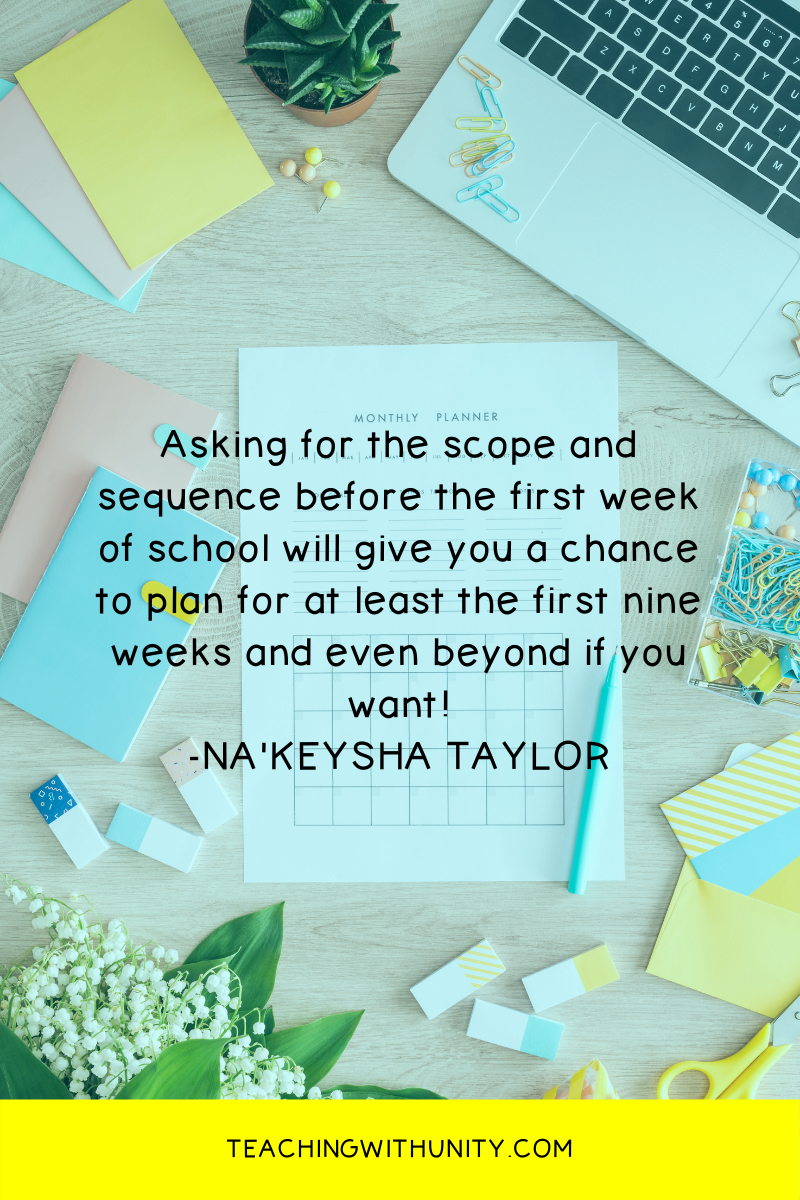
Ask for your scope and sequence before the first week of school.
A scope and sequence is a tool for teachers that lists the standard, theme, or units in the order they should be taught; some might also contain related activities. Other names you might hear scope and sequences called are pacing guides or year at a glance. No matter what your school calls it, this tool is necessary for effective planning. Asking for the scope and sequence before the first week of school will give you a chance to plan for at least the first nine weeks and even beyond if you want! This is one of the tips for a new teacher that sometimes gets looked over.
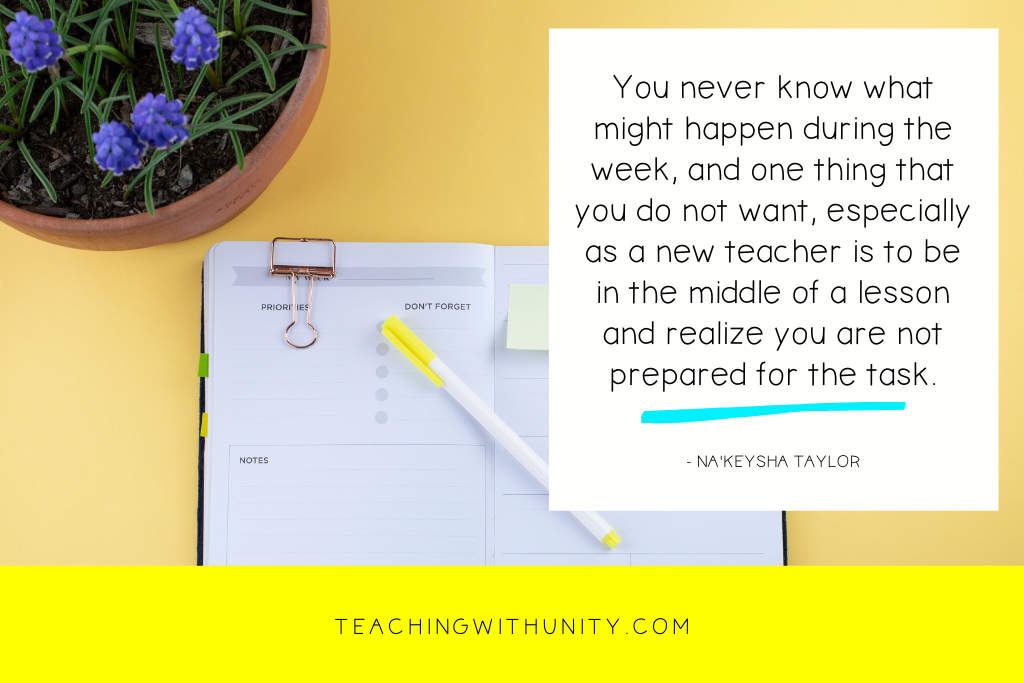
If you are looking for tips for lesson planning for new teachers, this is the tip for you. Plan ahead, my friend, plan ahead!
Give yourself at least one week before the lesson to have your plans done. Planning one week ahead will provide you with time to find all necessary materials, become comfortable with the content, and prepare your assessments. You do not want, especially as a new teacher, to be in the middle of a lesson and realize you are not prepared for the task.
When writing plans, I give myself one day each week to write my plans and find the materials. I also love to go to my local library after school and write my lesson plans there. I find the comfiest chair next to a large window and plan away! The next day at school, during my planning period, I find my printables, read-alouds, and materials that the students and I will need for the next week. If I don’t have specific materials, I go to one of my teammates or mentor teachers’ classrooms and ask them if they have what I need.
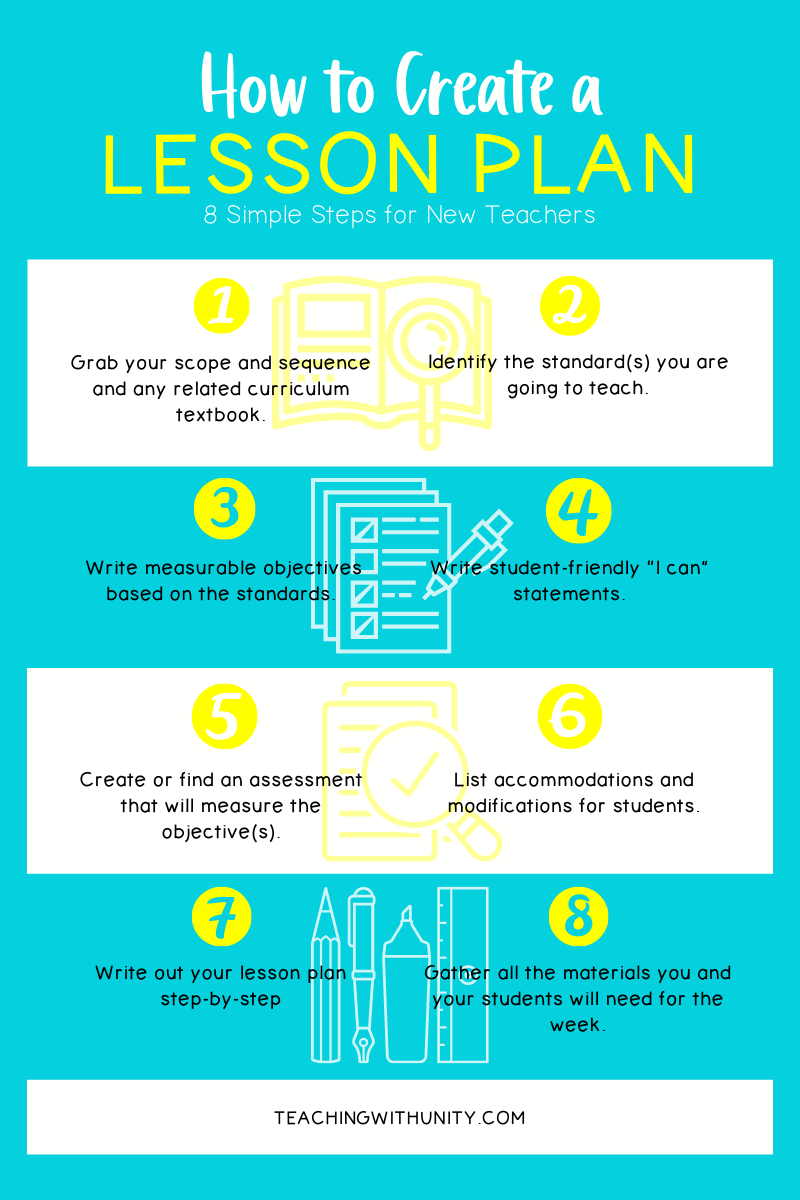
Bonus: Example of How to do Lesson Planning for New Teachers
- Grab your scope and sequence and any related curriculum textbook.
- Identify the standard(s) you are going to teach.
- Write measurable objectives based on the standards. Ex. TSW(The Students Will) identify the five senses.
- Write student-friendly “I can” statements. Ex. I can name my five senses.
- Create or find an assessment. Ex. The students will receive a dollop of ketchup to describe using their five senses. Possible answers: It smells like fruit, it tastes tart and sweet, etc.
- List accommodation and modifications for students. Accommodations: TSW receive a word list when describing a dollop of ketchup. Modifications: TSW sort materials by texture(i.e., Rough or smooth). Don’t forget to address different learning modalities. (Visual: video/illustrations, Auditory: podcast/read aloud, Tactile: model or other objects)
- Write out the Lesson Plan step-by-step. Ex. TTW(The Teacher Will) pass out a cracker to each student, lead the class in discourse about the cracker, and write the observations on an anchor chart.
- Gather materials. Ex. Crackers, ketchup, markers, a student handout, read-aloud, video, etc.
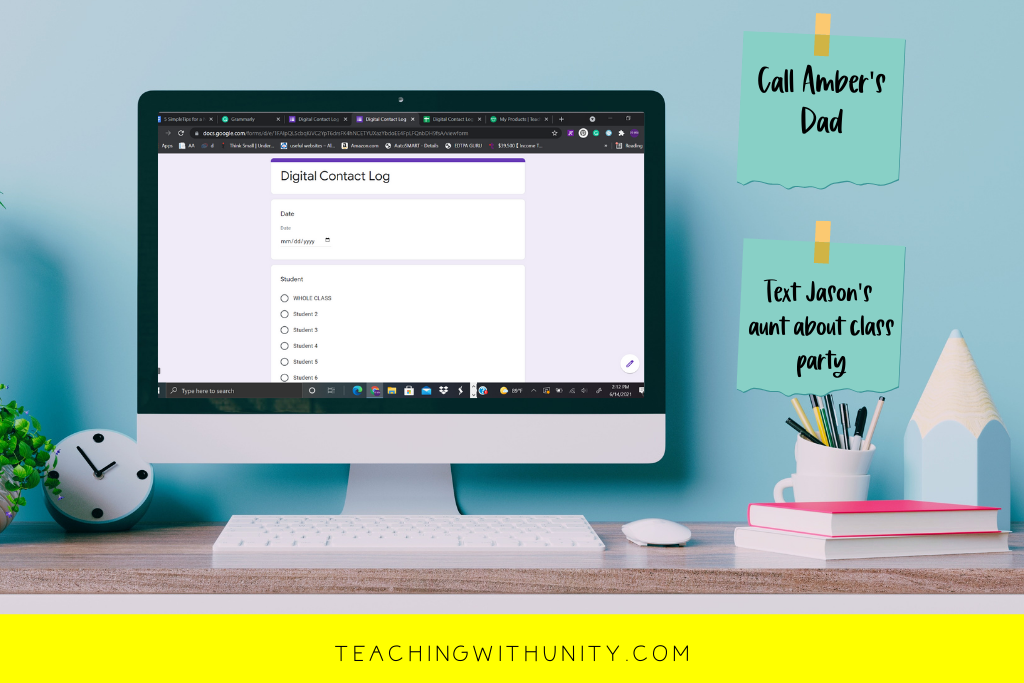
Keep a Communication Log.
I don’t know if anybody else will tell you this, but parent contact logs are so important! Because we are Title 1 school, we must turn in the form at the end of each nine weeks to show which parents we have contacted, the mode of contact, and the reason for contact. Keeping up with your parent contacts in an organized way helps you plan for parent conferences. You can look back and see which families you contact the most and why you are contacting them. Parent contact logs are also helpful if you have an issue to come up with a student and your administration asks for proof of contact; you will have exactly what you need. You can keep parent contact logs digitally or as a paper copy; it just depends on what will help you stay organized the best.
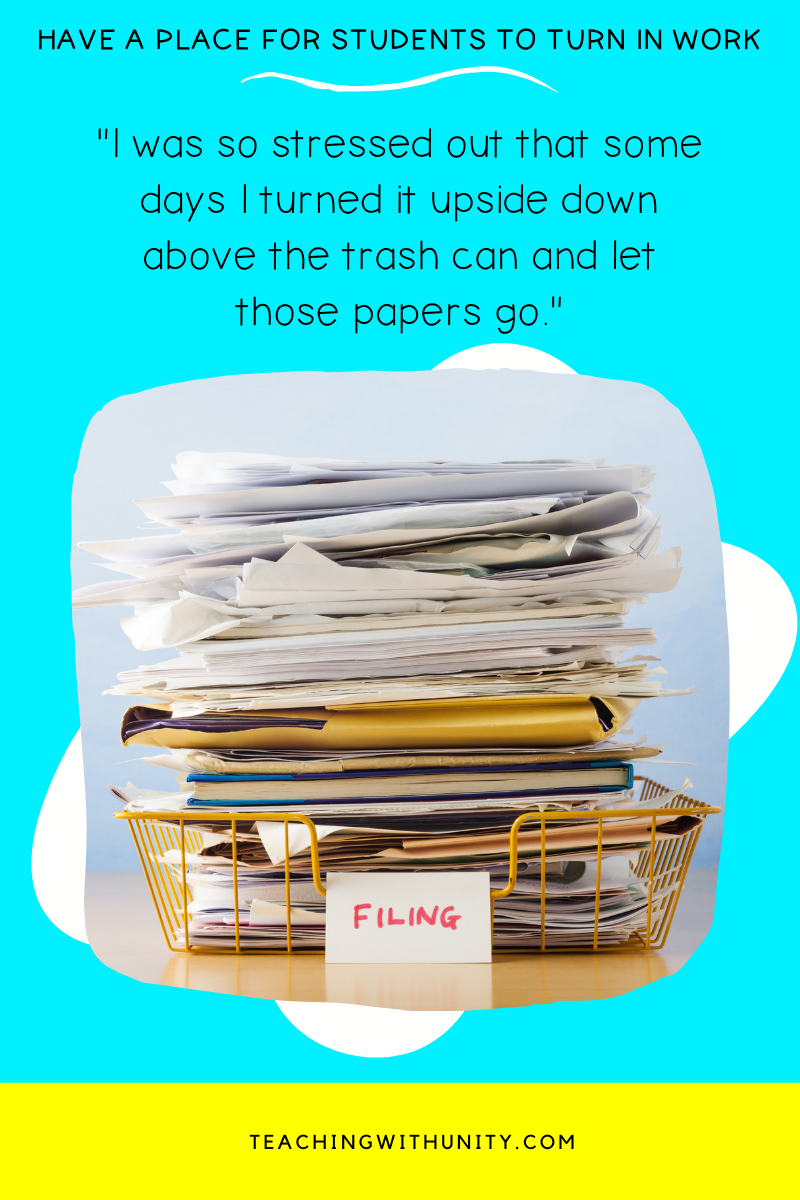
Have a place for your students to turn in work.
During my first year of teaching, I did not have anywhere for my students to turn in work. It was a hot mess! The single basket where my students turned in their work would overflow by the end of the day. I was so stressed out that some days I turned it upside down above the trash can and let those papers go. I am not telling you to throw away student work, but make sure you have somewhere to put that work.
While I was a student-teacher, all of my mentor teachers had different ways of collecting work from students. Some would have the students put their work in a paper basket, and others had students put their work in a plastic crate that held file folders for each student. One of the most organized was having a magazine rack or a filing tray, with a tray for each subject, and having students turn in work there. My plan for the 2021 – 2022 school year is to have about five different baskets where students will turn work in. Each basket will have a label on it for each subject. Make sure you teach students the procedure of how you want them to turn in work. For example, let students know that you want their work turned in the labeled reading basket when they hear the doorbell to change centers. Speaking of procedures Jennifer at jenniferbeaupre.com has some great tips for classroom management to help you have the best school year.
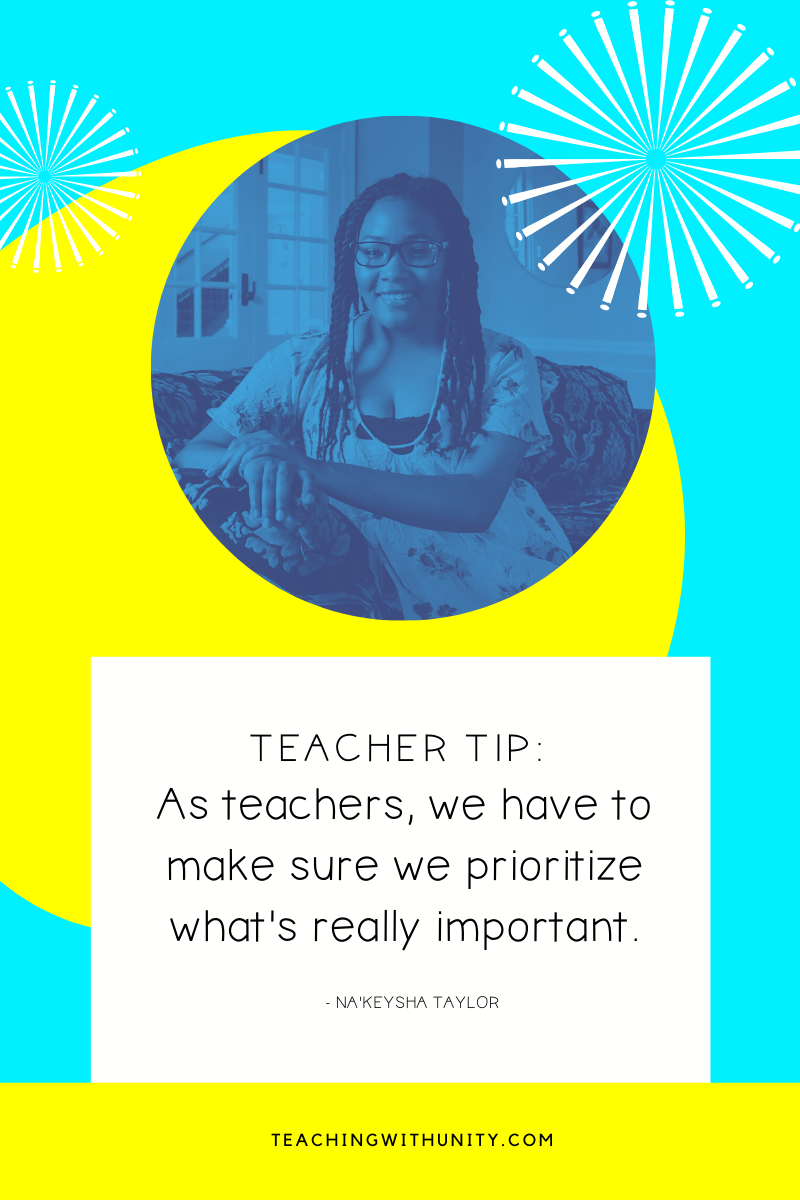
Make time for what you love.
The summer before my first year teaching, I read every blog post I could about being a new teacher. I watched all the videos(Thank you, Michelle Emerson!) about things people needed to know before beginning their first year of teaching. One thing that was consistent with each post was that, as teachers, we have to make sure we prioritize what’s really important. Depending on where you are in life, it might be your family, hobbies, or even your job. We are more than just teachers; we are people with relationships outside of the school building and life experiences that have nothing to do with being a teacher.
Most importantly, life does not revolve around your students. It might have seemed that way when you were a student-teacher because people might have told you to make sure you devote all your free time to your students and classroom during the first couple of years. I think about the time I spent as a first-year teacher staying 2 hours after my contract hours and getting there an hour and a half before anybody else, including both principals. I could have been at home with my mom eating breakfast or playing with my cat after school. With that time, I could have called family members I hadn’t spoken to in a while or read that book that had been collecting dust since I graduated from college. I’m saying all this to tell you that your students are not the only people in your life who matter.
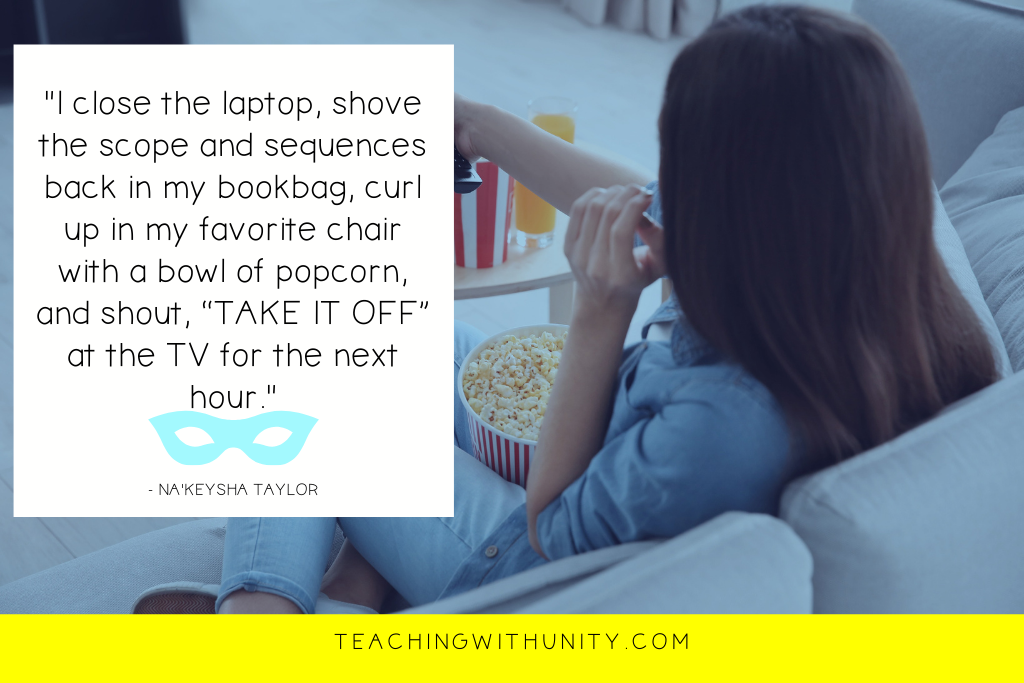
How I Make Time for Myself
One way you can prioritize yourself is by scheduling time to do something just for you. My mom and I love to watch Fox’s The Masked Singer! It comes on every Wednesday night, so at 7 PM each Wednesday, I close the laptop, shove the scope and sequences back in my bookbag, curl up in my favorite chair with a bowl of popcorn, and shout, “TAKE IT OFF” at the TV for the next hour. Do I think about “all the things” during that hour, of course! Do I regret spending that time with my mom? Of course not! I hope you can find at least one way to prioritize yourself during the school year. This is one of my favorite tips for a new teacher!
One Idea to Make Time for Yourself
If you are a teacher who loves to write, I suggest blogging. Blogging will give you the chance to share what you know as a teacher and connect with other teachers. Even if you are a new teacher, you can use blogging to reach others who might be going through the same learning process as you. You don’t have to be an expert or the best writer to start a blog. I don’t think I am the best writer, but writing on my blog helps me to build my confidence. Reading 7 Helpful Tips on How to Blog Like a Boss can help you get started with your first blog.
These are the tips that I wish somebody told me when it was my first year as a teacher. I heard make sure I write your lesson plans and make time for myself, but they did not give me examples. I hope that you were able to gain valuable tips that you can put into practice. If you know someone looking for help for first year teachers or tips for a new teacher, send them the link to this blog post to let them know you are looking out for them. Do you have any tips for a new teacher? If you need tips on how to support your students’ prosocial behavior visit Clare at thekeepingitcalmteacher.com. I promise learning more about positively supporting your students’ behavior will definitely help you have the best school year ever! Let me know in the comment section what you would tell a new teacher. If you would like to chat about how it feels to be a new teacher, connect with me on Instagram @TeachingWithUnity or join my email list by clicking here.

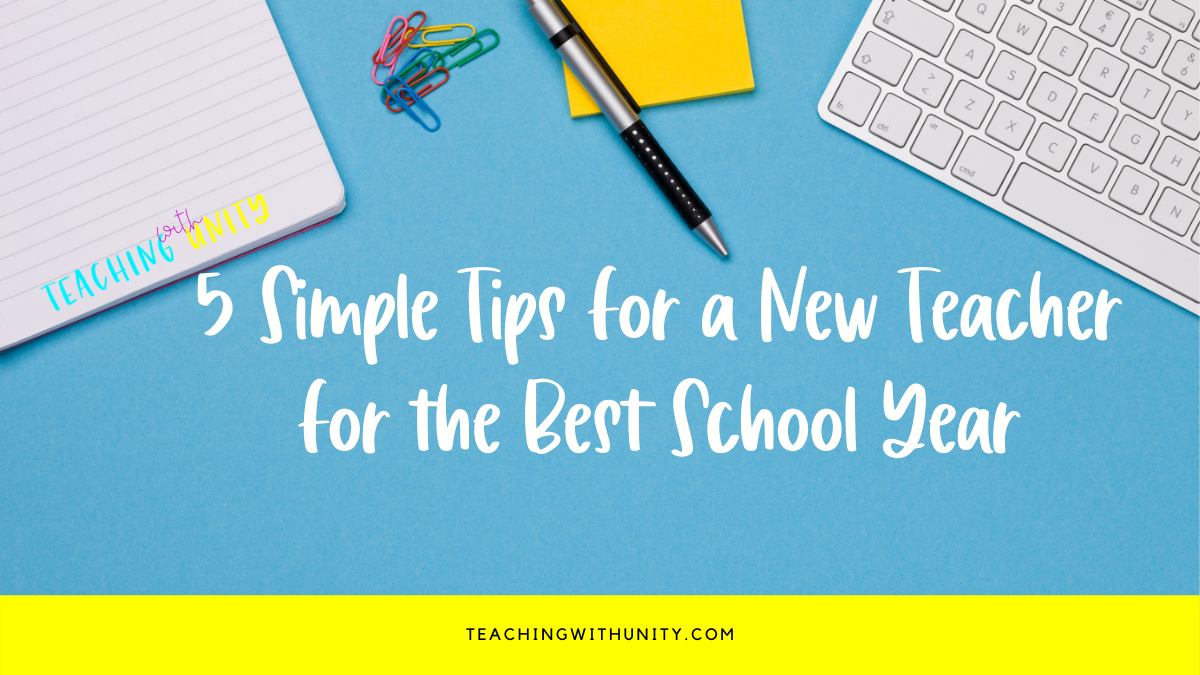


2 Responses